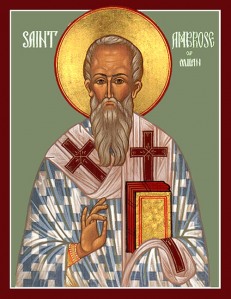 Living faith is inspired in the human heart by contemplation of the word of God and by the Holy Spirit.
Living faith is inspired in the human heart by contemplation of the word of God and by the Holy Spirit.
For this reason we should read and heed the word of God and pray that God Himself ignite the lamp of faith in our heart.
The fear of God arises most often from contemplation of the omnipresence of God and His omniscience.
God is in essence everywhere present; and wherever we may be, He is with us; and whatever we may do, say, think, and undertake, we do, say, think, and undertake all before His holy eyes.
And He knows our deeds far better than we do ourselves. Think about this, O Christian, and heed it, and with God’s help the fear of God will be born in you.
[…] Keep God, then, before your spiritual eyes and you will have the fear of God, imitating the Psalmist, “I beheld the Lord ever before me” (Ps. 15:8).
[…] While standing in church attend diligently to the reading and singing. This gives birth to compunction, true prayer, heartfelt singing and thanksgiving.
Avoid, then, standing bodily in church while wandering outside the church in mind, and standing bodily before God while wandering about in spirit in worldly affairs, lest that saying be applied to you, “his people draweth nigh unto Me with their mouth, and honoureth Me with their lips; but their heart is far from Me” (Mt. 15:8).
While standing bodily in church, then, stand with heart and spirit as you stand before God. When you look upon the icons of the saints, call to mind that One is the Creator that created them and you, and that His purpose was the same for them as it is for you, that is, to save both them and you.
They are glorified, and before you lies the same glory, only imitate their lives and you shall be saved.
Prayer consists not only in standing and bowing before God in body, and in reading written prayers, but even without that it is possible to pray in mind and spirit at all times and in everyplace.
You can do it while walking, sitting, reclining, among people, and in solitude. Raise up your mind and heart to God, and so beg mercy and help from Him.
For God is everywhere and in every place, and the doors to Him are always open, and it is easy to approach Him, not as with man.
And we can approach Him with faith and with our prayer everywhere and at all times, and in every need and circumstance. We can say to Him mentally at any time, “Lord, have mercy, Lord help!” and so on.
Tikhon of Zadonsk (1724-1783; Russian Orthodox): extract @ Kandylaki from Journey to Heaven: Counsels On the Particular Duties of Every Christian by Our Father Among the Saints, Tikhon of Zadonsk, Bishop of Voronezh and Elets (Jordanville, NY: Holy Trinity Monastery, 2004) .
















